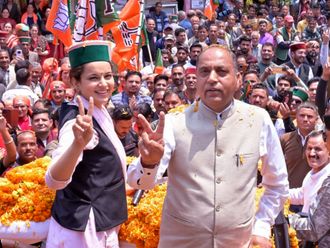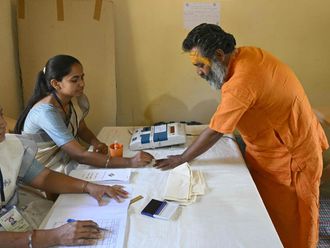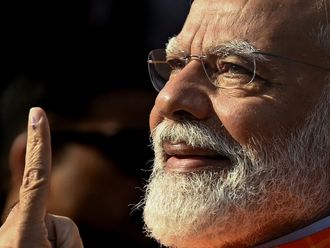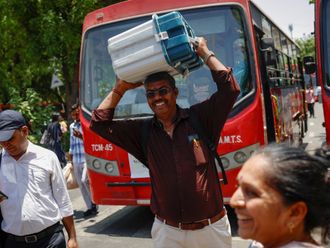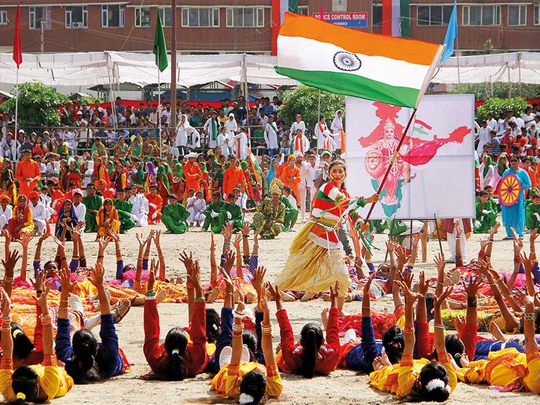
New Delhi: Prime Minister Narendra Modi urged India on Tuesday to reject religious violence, after a series of attacks against minorities sparked debate about whether a surge of Hindu nationalism is undermining the country’s secular ideals.
In a speech from the ramparts of Delhi’s Red Fort marking the 70th anniversary of India’s independence, Modi also listed his government’s achievements, including a fight against corruption.
The speech was light on foreign policy, making no mention of arch-rival Pakistan or of China. India has for nearly two months stationed hundreds of troops along its northern border with China because of a territorial dispute.
Modi has spoken out against attacks by right-wing Hindus, many of whom back his Hindu-nationalist Bharatiya Janata Party (BJP), against minority Muslims and lower-caste Hindus accused of killing cows, considered holy by the majority Hindus.
But the setting of his denunciation of violence on Tuesday was significant.
“We will not tolerate violence in the name of faith,” Modi said before a teeming crowd at the fort and a huge television audience.
Modi made much of the progress India has made since independence from British rule in 1947.
But he also expressed pain over the death of at least 60 children in a state-run hospital last week amid shortages of supplies — a reminder much remains to be done on India’s journey to development.
‘Aura of progress’
Since coming to power in 2014, Modi has found it difficult to balance the competing demands of groups from his nationalist Hindu power base and those Indians striving to build a modern, secular country befitting its growing economic influence.
Manoj Joshi, a fellow at the Observer Research Foundation think tank said Modi was playing “good cop, bad cop” by condemning communal violence but doing little to rein in elements of his ruling party.
“There is an obvious gap between slogan and implementation.
It’s a deliberate gap and it’s just for the record,” he said.
Modi also spoke at length about delivering a “new India” by 2022, underlining his confidence of winning the next general election, due by 2019.
Strong growth and economic reforms have bolstered Modi’s popularity and helped his party sweep state elections in recent years, leaving the opposition severely weakened.
Still, to keep up with the demands of India’s 1.3 billion people, the government needs to create millions more jobs a year, which it is struggling to do.
“A certain level of triumphalism ... brought Modi to power,” analyst Ajai Shukla told NDTV. “Now he realises people are expecting answers. He felt the need to convey an aura of progress.” Modi was conciliatory towards the Muslim-majority Himalayan region of Kashmir, where violent protests against Indian rule have erupted over the past year, saying neither “name-calling nor bullets” would be enough to pacify the region.
What was needed, he said, were “hugs” for Kashmiris.
Kashmir has been divided between Pakistan and India, and a source of conflict between them, since their creation upon the partition of British-ruled India in 1947.
Millions poured out of their homes to take part in events big and small all across the country. A shutdown called by separatists affected life in the Kashmir Valley and in some parts of the northeast.
“Security of the country is our priority. Internal security is our priority. Whether it is our oceans or borders, cyber world or space, for all kinds of security India is capable of defeating all such inimical forces,” Modi said amid a dragging border row with China.
Beyond India, the day was also celebrated by Indians living abroad. Even the Indian cricket team got into the act at its hotel in Colombo.
From tricolor marks on cheeks to flag designs printed on T-shirts, from tricolor caps to suits, the Indian flag could be seen everywhere.
Despite persistent tensions, border guards of India and Pakistan exchanged sweets along the International Border in Punjab.
RSS chief Mohan Bhagwat’s unfurling the Indian tricolor at a government-aided school in Kerala’s capital Thiruvananthapuram even after being told by authorities that political personalities are not allowed to do so triggered a row.
Days after over 60 children died in a Gorakhpur hospital, Uttar Pradesh Chief Minister Yogi Adityanath termed the tragedy an “eye-opener” and sought to blame it on encephalitis.
In neighbouring Bihar, Chief Minister Nitish Kumar pledged to provide good governance and not to compromise with corruption.
In Srinagar, Jammu and Kashmir Chief Minister Mehbooba Mufti asked the young to give up guns and stones and also vowed to fight for the state’s special Constitutional status.
Goa Chief Minister Manohar Parrikar ordered a crackdown on rave parties and late-night music events in remote areas of his state.
West Bengal Chief Minister Mamata Banerjee unfurled the tricolor and oversaw a colourful parade at the arterial Indira Gandhi Sarani.
In Bhubaneswar, Odisha Chief Minister Naveen Patnaik suddenly felt unwell while addressing the gathering. Aides later said he was fine.
Independence Day celebrations were also reported from Hyderabad, Shimla, Thiruvananthapuram, Dehradun, Chandigarh, Gurugram, Gurdaspur, Aizwal and other state capitals and major cities.


